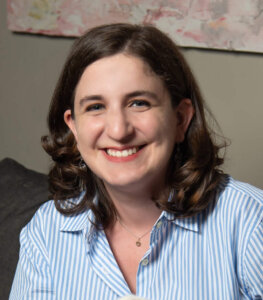Stickers applied by protesters to the doors of Butler Library at Columbia University on May 7. Photo by Indy Scholtens/Getty Images
This week, events at Columbia University offered us two reminders. The first: President Donald Trump’s plans to fight antisemitism on college campuses are actually about cracking down on higher education, not about fighting antisemitism. The second: The university is deluding itself if it thinks that pretending otherwise will benefit it, or help Jewish students.
Back in March, Trump’s administration announced that it would strip $400 million in federal funding from Columbia because of what it said was the university’s failure to fight antisemitism. And the university largely agreed to comply with the administration’s demands — crafted to, purportedly, combat on-campus antisemitism — in order to have federal funding restored.
To put it plainly: This did not work. On Tuesday, the university’s acting president, Claire Shipman, announced that while conversations with the federal government about restoring the frozen funding are ongoing, many funds remain unpaid, meaning that “nearly 180 of our colleagues who have been working, in whole or in part, on impacted federal grants, will receive notices of non-renewal or termination.” Then, on Wednesday, pro-Palestinian protesters took over Butler Library, the main library on Columbia’s campus. Close to 80 activists were arrested.
These events, lined up next to each other, demonstrate just how obvious it is that Trump’s funding cuts have no relationship to Jewish safety — or, for that matter, on whether pro-Palestinian protests, which his administration has cast as unilaterally antisemitic, continue.
This is not just a reflection on the ill intentions of Trump’s administration in pursuing a broad academic crackdown under the guise of combating antisemitism. It’s a reflection on Columbia, which did not push back against the idea that the administration’s demands were necessary steps to fight antisemitism; insist that they would not compromise academic freedom; or point out that Jewish student safety is being used as a pretense to attack institutions of higher education and free speech. The university now looks naive, and the administration looks malicious.
A Columbia University spokesperson I contacted told me that among the “research initiatives that have been cut due to grant cancellations from the federal government” are “a study focused on reducing maternal mortality and morbidity in New York State”; “a network of pediatric cardiac centers performing clinical research benefiting patients with congenital heart disease and children with acquired heart disease”; and “a study to understand the effect of anesthesia medications on neurodevelopment in preterm infants, who spend more time in the NICU and have greater exposure to anesthesia compared to full-term infants.”
How exactly might cutting funding into research that could improve the lives of mothers and children help Jews? And how does cutting funding into research that could improve the lives of mothers and children, and saying that the funding is being cut for the benefit of Jewish students, keep Jews safer? This is to say nothing of the Jewish researchers whose funding will be caught up in these cuts, or the Jewish patients who would surely benefit from such studies.
Of course, these moves do exactly what the Trump administration intended: Use antisemitism as a pretext to attack institutions of higher education. Rather than fighting antisemitism, the Trump administration is attacking something unrelated to Jewish safety, thus establishing an exciting new problem for Jews to face blame over. It doesn’t take a researcher, funded by the federal government or not, to understand that that will hurt, not help, the fight against antisemitism.
Columbia should have seen this coming. Trump has, within his administration, elevated people who push antisemitic conspiracies. In our society at large, he’s helped create a permission structure for white supremacists and domestic extremists. The cravenness of his demands was obvious from the start; the cravenness of Columbia going along with the farcical claim that they would help Jews feel safe at the university is still becoming apparent.
Which takes us to Wednesday’s protest. One goal of the Trump administration’s assault on campuses has clearly been to quash exactly this type of civil unrest. That is true whether or not such unrest includes actual antisemitic rhetoric; the detention of students like Rümeysa Öztürk, whose only apparent infraction was co-authoring a student paper op-ed decrying the war in Gaza, has made that clear.
For those Jews, and especially Jewish students, who feel threatened by these protests, the fact that such a major one broke out despite Trump’s crackdown should be a reminder that, actually, the president’s various efforts aren’t really set up to help them. And to the rest of us, it should be a reminder that there are costs to acceding to the administration’s pretense that every such protest is, automatically, an offense against Jews.
Shipman, the university’s acting president, said in a statement that “Columbia strongly condemns violence on our campus, antisemitism and all forms of hate and discrimination.” The university is, of course, right to push back against vandalism and violence. But to echo the administration in reflexively conflating a protest against an ongoing war in Gaza — the aid blockade of which has entered its third month, leading to a rise in malnutrition — with antisemitism is troubling.
So, too, is the fact that the statement made no mention of what Columbia will do to protect international student protesters arrested after Columbia requested that the NYPD aid in breaking up the protest, whose visas the Trump administration is reportedly reviewing. (In fact, in a letter to “members of the Columbia community,” Shipman appeared to blame the protesters for making the institution a target at a moment when international students are vulnerable.)
In response, the federal office of public affairs for the Department of Health and Human Services put out a statement on behalf of the administration’s antisemitism task force, expressing approbation for Shipman’s “strong and resolute statement regarding the unlawful, violent and disgraceful takeover of Butler Library yesterday.”
The task force, the statement added, saw the short-lived library takeover as an example of “precisely why the American people are demanding that the administration act to implement meaningful and enforceable commitments to enforce civil rights laws with institutions that receive taxpayer dollars.”
So Columbia has been compelled to fire researchers pursuing important scientific projects; is still facing a Trump attempt to secure federal oversight of the university; and may well be confronting a new wave of high-profile efforts to deport international students involved in Wednesday’s protest. Such is the prize for winning the game of continuing to pretend that the Trump administration is truly trying to improve the campus environment for Jews.
Where does all this leave Jewish Columbia students? They’re being used as justification for cutting funding for university research into the health of mothers and children. They’re being used to justify their peers’ deportations. And their university is going along with the idea that all of this is being done in the name of fighting antisemitism. Meanwhile, the war in Gaza is ongoing, and campus protests are, too.
To put this in context, a new poll from the Brookings Institution says that most Americans don’t agree that Trump’s attacks on higher education are primarily about combating antisemitism. More troublingly, they increasingly see the label of “antisemitism” as a signal of a political attack — a term used to criticize political opponents, not to refer to an urgent and real problem.
All of which is to say that Trump’s efforts are helping lead people to take charges of antisemitism less, not more, seriously. But, then, that doesn’t seem to have ever been their real goal, regardless of what universities do or don’t pretend.

I hope you appreciated this article. Before you go, I’d like to ask you to please support the Forward.
Now more than ever, American Jews need independent news they can trust, with reporting driven by truth, not ideology. We serve you, not any ideological agenda.
At a time when other newsrooms are closing or cutting back, the Forward has removed its paywall and invested additional resources to report on the ground from Israel and around the U.S. on the impact of the war, rising antisemitism and polarized discourse.
This is a great time to support independent Jewish journalism you rely on. Make a gift today!
— Rachel Fishman Feddersen, Publisher and CEO

